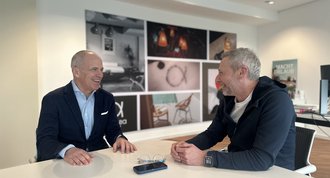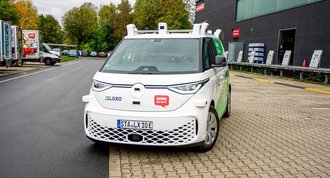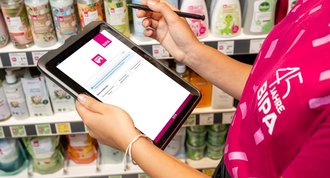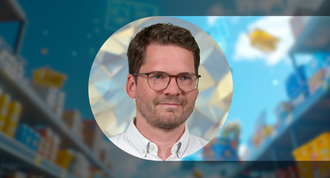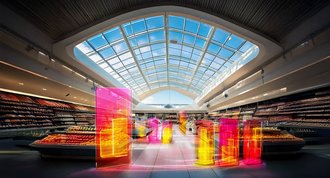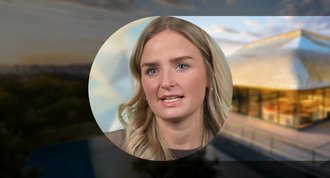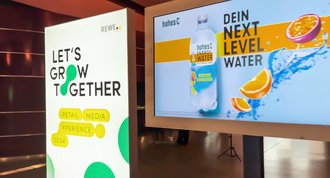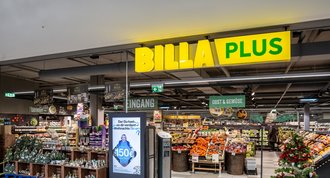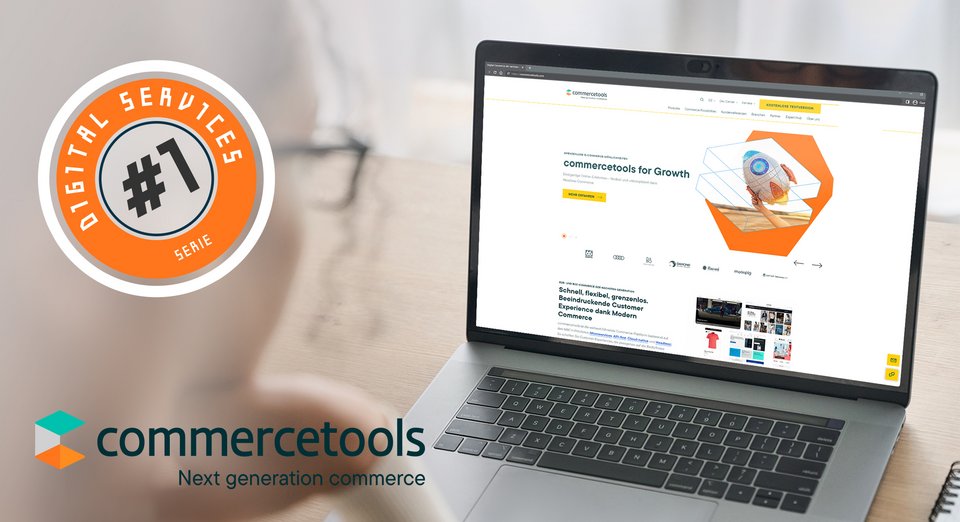
All good things come in threes - this is how the model behind REWE Group's three digital technology subsidiaries can be summarised. Commercetools, paymenttools and fulfilmenttools handle online shopping from the selection of the product to the shopping basket and the payment process through to the logistics behind the delivery. We present one company every week. We start with commercetools.
REWE Group has been investing in commercetools for almost eight years. The demand for the modular retail software has risen rapidly, and not just since the pandemic. Last year alone, revenue doubled and is expected to reach almost 100 million euros by 2022. One spoke to CEO and co-founder Dirk Hoerig about flexibility in online retail, unicorn status and growth markets overseas.
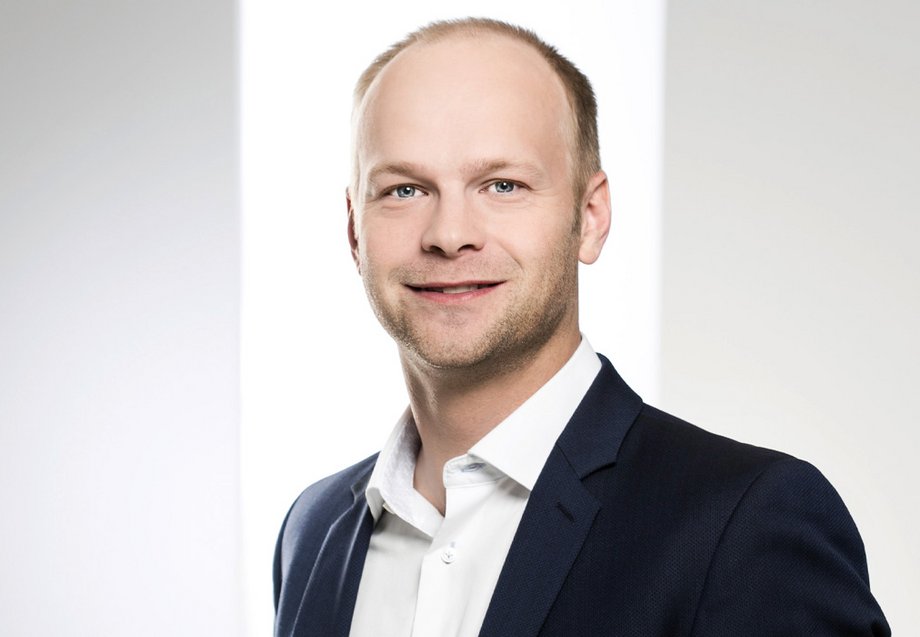 Dirk Hoerig, CEO commercetools
Dirk Hoerig, CEO commercetools
one: Mr Hoerig, to get our readers off to a good start: What exactly does commercetools do? What service do you offer and how do you differ from "conventional" providers? Or to put it another way: is there a catchy image for what microservices-based, API-first, cloud-native, headless (MACH) technology is?
Dirk Hoerig: We offer software for online retail with a focus on companies that want to grow quickly and offer outstanding shopping experiences. We concentrate on companies that need to react quickly to new customer needs and place great value on flexibility in terms of technology. We also recognise the benefits of the cloud, which is particularly important when our systems need to be available due to high visitor volumes. We have therefore geared our retail software towards companies that have similar requirements and do not want to rely on an inflexible monolith that is comparatively cost-intensive and time-consuming to develop.
one: How can I imagine that?
Dirk Hoerig: A good analogy comes from the toy industry: if you buy a Playmobil farm, you can get started quickly because most of the parts are prefabricated. But it's difficult to expand the farm or use it for a completely different purpose. This made sense at the beginning of online retail, when there was only the PC and little competition and change. Now, however, many customers need more flexible solutions. In comparison, our software is like a Lego farm. You have many individual parts that you have to assemble first, but you can easily expand the farm. The individual parts fulfil a specific function, but can be expanded or rebuilt at any time and adapted to new requirements. Our modular system is more flexible.
As early as 2010, we recognised that online retail would not only play a role on computers, but also on smartphones and tablets. The necessary customisations are easy to implement with commercetools. Or take an online shop for fashion that now wants to expand its catalogue to include furniture. Here you have completely different requirements for the information you want to give the customer. Our technology allows you to add this additional information quickly and flexibly. You could say that our software offers a modular system from the cloud with maximum flexibility, security and scalability.
„Since 2021, we have been one of the top 5 software companies worldwide in terms of size that offer online retail technology. In Europe, we are number 2 after SAP, and in terms of our growth, we are number 1.“

one: You have been active on the market with commercetools for 11 years and were a pioneer in the field of cloud-based headless e-commerce systems. Nevertheless, 2021 was a special year for you. Why is that?
Dirk Hoerig: You're alluding to Accel's entry and our first acquisition. Yes, everything got a few sizes bigger last year. However, even in the years before that, we regularly had to reinvent ourselves. We are constantly working on product topics and thinking about what our customers need. From this perspective, 2021 was similar to previous years, only a few dimensions bigger. With Accel, we have brought a top investor on board who has invested in numerous large US tech companies such as Facebook and Slack. And with a valuation of one billion, we have cleared the hurdle to becoming a unicorn. Last but not least, we took over our first start-up. We are delighted that we were able to convince our colleagues at Frontastic to join us.
one: You just mentioned it: commercetools has been a unicorn since 2021 - one of the few German companies with a valuation of over one billion euros. What does that mean for a company?
Dirk Hoerig: First of all, the rating helps our company to become more relevant and visible to a broader public. Since 2021, we have been one of the top 5 software companies worldwide in terms of size that offer online retail technology. In Europe, we are number 2 after SAP, and in terms of growth, we are number 1.
Another and more important aspect for us is the cooperation with our shareholders. Both Insight Partners and Accel are among the most successful technology investors in the USA. This expertise is now available to us and is helping us to sort out the challenges and issues that lie ahead. Last but not least, it is important for us how we are positioned internally. We are constantly looking at our long-term orientation and whether we have the best team on board - unicorn status is also a plus in this respect. Overall, we have been the fastest growing company in the industry in recent years and that is simply down to the product.
„We have focussed our products extremely on the customer and try not to react to the problems of the future with adapted old solutions. That would be like putting a combustion engine in a Tesla. That doesn't make a modern car either.“

one: The figures for 2021 are impressive: over 150 new customers. And they come from completely different industries and also have different target groups - from B2B to B2C. Is specialisation no longer necessary?
Dirk Hoerig: It's like this: The companies that come to us are basically facing growing pains. They are wondering how they can grow even faster and have often already earned many millions or even billions in online retail. Now they are reaching the limits of scalability and flexibility. And that's exactly what we give companies. They can grow faster with our products and no longer have any limitations. That's because we've geared our products extremely towards the customer and don't try to respond to the problems of the future with customised old solutions. That would be like putting a combustion engine in a Tesla. That wouldn't make a modern car either.
one: Many tech companies owe their success in recent years primarily to the pandemic and the associated growth in online retail. How sustainable is this success?
Dirk Hoerig: Overall, online retail has been growing for years and the pandemic has given it a further boost. However, you have to differentiate in which categories. Preferences differ depending on the occasion, whether it's food or non-food and also by region.
But generally speaking, I assume that the trend is sustainable and that we will see even more growth. You only have to look at the figures: 4 out of 10 items of clothing of the same price are now bought online. We have a total market share of 20 per cent in non-food retail.
If you look at the growth, it is also clear that there is no linear development in online retail. It used to take around 23 years to achieve a market share of 20 per cent. But we have achieved the last 5 per cent in the last 2 to 3 years. This means that in the next 5 to 10 years alone, we will grow at least as much in online retail as in the previous period combined.
„We no longer travel through the city in a carriage. Things are changing and we have to think about what the right answer is for our customers.“

one: What does this mean for bricks-and-mortar retail?
Dirk Hoerig: It certainly doesn't mean that bricks-and-mortar retail is irrelevant. And it depends on whether we look at food or non-food. Customers experience non-food retail differently today. It's more about the experience. If you take the city as an example, customers go to the city centre to be inspired. But afterwards they want to go out for a meal or to the cinema. Then they still have their shopping sent home because they don't want to walk around with the bags. In short, the model of retail being an on-site logistics centre where I help myself is becoming increasingly obsolete. After all, we no longer travel through the city by coach. Things are changing and we have to think about what the right answer is for our customers.
one: It was only last autumn that you acquired your first start-up, Frontastic. How does the company complement your services?
Dirk Hoerig: Frontastic offers a product that allows online shopping worlds to be put together very quickly on PCs, smartphones and tablets. Frontastic specialised in commercetools customers years ago. Frontastic primarily helps customers who want flexibility but need someone to pre-configure many settings and applications as a first step. To stick with my Lego image from the beginning: It's aimed at customers who would like to have 80 per cent of the Lego model already assembled, but with the option to take it apart again later and add functions.
one: Looking ahead to 2022, where should we go next?
Dirk Hoerig: For the current year, we are focussing on three things: Firstly, we want to further extend the lead of our products and, among other things, provide more functionalities for the B2B sector. This is because demand and our customer base are very high in this area and this gives us the opportunity to differentiate ourselves from the competition. At the same time, we will double our production capacity and open a third development centre in Valencia in addition to Berlin and Durham in the USA.
The second focus will be on expanding our market presence in our core markets of North America and Europe. We will almost double our sales and marketing activities there. We are very confident that we will have another very good year in these regions.
The third focus is on areas where we are trying something new. There are a number of topics that we are now taking up. These include China, which we have been looking at for some time. We were slowed down here by the pandemic. But now we are focussing on the country again.
Overall, we want to maintain and expand our leading position. We therefore expect to double our personnel capacities. This means that we also have a lot of recruiting challenges.
one: Mr Hoerig, thank you very much for the interview.
commercetools is a leading global software company and stands for the eponymous platform for next-generation B2C and B2B commerce. The cloud-based headless e-commerce software is based on an API-first approach and flexible microservices.
commercetools offers its customers flexible development modules and a genuine cloud platform. This enables companies to realise innovative business models and offer their customers comprehensive and inspiring shopping experiences across all touchpoints. International brands and Fortune 500 companies from a wide range of industries - from automotive to telecommunications and retail to fashion - use the multi-tenant SaaS solution from commercetools GmbH.
Since its foundation in 2006, commercetools has been headquartered in Munich. With branches in the USA, Europe and the Asia-Pacific region, the company has a global presence.
Further information can be found at https://commercetools.com/de/.
The company offers its customers flexible development modules and a true cloud platform that fulfils local data protection requirements while offering maximum scalability.
Since its launch in 2010, commercetools has been headquartered in Munich. With branches in the USA, Europe and the Asia-Pacific region, the company has a global presence.

